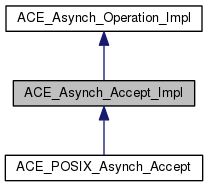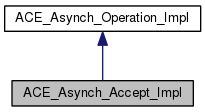|
ACE
6.1.0
|
|
ACE
6.1.0
|
Abstract base class for all the concrete implementation classes that provide different implementations for the ACE_Asynch_Accept. More...
#include <Asynch_IO_Impl.h>


Public Member Functions | |
| virtual | ~ACE_Asynch_Accept_Impl (void) |
| virtual int | accept (ACE_Message_Block &message_block, size_t bytes_to_read, ACE_HANDLE accept_handle, const void *act, int priority, int signal_number, int addr_family)=0 |
Protected Member Functions | |
| ACE_Asynch_Accept_Impl (void) | |
| Do-nothing constructor. | |
Abstract base class for all the concrete implementation classes that provide different implementations for the ACE_Asynch_Accept.
| ACE_Asynch_Accept_Impl::~ACE_Asynch_Accept_Impl | ( | void | ) | [virtual] |
| ACE_Asynch_Accept_Impl::ACE_Asynch_Accept_Impl | ( | void | ) | [inline, protected] |
Do-nothing constructor.
| virtual int ACE_Asynch_Accept_Impl::accept | ( | ACE_Message_Block & | message_block, |
| size_t | bytes_to_read, | ||
| ACE_HANDLE | accept_handle, | ||
| const void * | act, | ||
| int | priority, | ||
| int | signal_number, | ||
| int | addr_family | ||
| ) | [pure virtual] |
This starts off an asynchronous accept. The asynchronous accept call also allows any initial data to be returned to the <handler>. Upto bytes_to_read will be read and stored in the message_block. The accept_handle will be used for the <accept> call. If (accept_handle == INVALID_HANDLE), a new handle will be created.
message_block must be specified. This is because the address of the new connection is placed at the end of this buffer.
Implemented in ACE_POSIX_Asynch_Accept.
 1.7.5.1
1.7.5.1